Dangerous advice
A colleague wrote to his MP to ask if anything could be done about the defrauding of the public by “psychic surgeons”. He wrote, in particular, about Stephen Turoff.
Turoff was the subject of the first episode of “Trust me I’m a Healer”, a programme that looked at “fake psychic healers”. They are the BBC’s own words (see badpsychics.com).

Psychic surgery is nothing but a total hoax.
Psychic surgery was discredited by the U.S. Federal Trade Commission in 1975. In a unanimous opinion, the commission declared that “‘psychic surgery’ is nothing but a total hoax.” Judge Daniel H. Hanscom, in granting the FTC an injunction against travel agencies promoting psychic surgery tours, said: “Psychic surgery is pure and unmitigated fakery. The ‘surgical operations’ of psychic surgeons … with their bare hands are simply phony.” (see here)
Eventually my colleague got an answer from Lord Hunt, junior minister at the Department of Health (generally loyal Blairite, but he did resign over Iraq).
The response makes one wonder what planet the minister is living on Psychic fraud a “profession”? And capable of self-regulation? This letter is just surreal.

Clearly misunderstanding the nature of science is not restricted to any political party. In any case, regulation of crackpot medicine arguably does more harm than good (see Letter to the Times).
Most sorts of crackpot medicine are desperate to be “regulated” by the government. They know that the regulation is ineffective, and they know that it gives them a stamp of government approval with few obligations on their part. They can then claim to be “professional” psychic surgeons
(or whatever) and pretend to be proper doctors. And foremost among those pressing for this sort of phony respectability has been the Prince of Wales Foundation for Integrated Health (see here and here).
An early day motion in support of homeopathic hospitals shows that irrational belief in magic is not unique to one party. Virtually all MPs have no idea about science. But I was quite surprised to find out in a reply from my MP that it is official Conservative policy.
Read more on the original IMPROBABLE SCIENCE page
A web site comes very close to claiming that cancer can be cured by a homeopathic preparation made from the blood of someone who had, allegedly, been cured of cancer by laying-on-of-hands. The site is run by a Sue Benford who has also written papers that suggest “explanations†of spontaneous human combustion and the incorruptibility of human corpses. All this scores maximum points for bizarreness. It would be hilarious but for the fact that it takes advantage of sick patients.
Read more on the original IMPROBABLE SCIENCE page
The latest Cochrane review finds no good evidence that acupuncture or acupressure are effective for stopping smoking
Read more on the original IMPROBABLE SCIENCE page
Two scams in which the alleged ingredients don’t exist, and the alleged evidence can’t be traced.
Read more on the original IMPROBABLE SCIENCE page
Sales of chondroitin and glucosamine are a worth billions of dollars, but the evidence that they work has never been good.
A new meta-analysis of clinical trials now shows that chondroitin on the symptoms of osteoarthritis is “minimal or nonexistent”.
(Reichenbach S and others. Meta-analysis: Chondroitin for osteoarthritis of the knee or hip. Annals of Internal Medicine 146:580-590, 2007: download the paper]
It is the same old story. Early trials were small and badly-designed. They seemed to show some effect, which was wildly exaggerated by the supplement hucksters to push sales. Eventually somebody does the trials properly, and it is found that there is little or no benefit.
Look at Figure 6 from the paper (below). It shows the size of the beneficial effect plotted against the year of publication. The black circles represent trials with a large number (over 200) patients, the white circles are smaller (and mostly badly-designed) trials. As soon as the trials are done properly, the alleged benefits vanish.
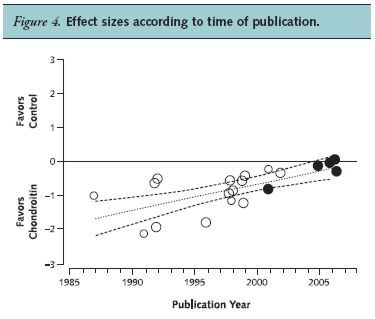
The authors conclude “Use of chondroitin in routine clinical practice should therefore be discouraged.”
Analyses by ConsumerLab.com has reported that 8 out of 20 products said to contain chondroitin failed its quality tests, with four containing between 0% and 8% of amount stated on the label.
Glucosamine shows a similar trend. Glucosamine is a synthetic chemical, but it is not a licensed medicine in the UK. It is marketed as a “food supplement”, not as a drug. It is not approved for precription on the NHS. The latest Cochrane review does not entirely rule out some benefit, but again the effects seem to get smaller as the trials get better.
Thanks to Quackwatch for the alert about the Reichenbach paper.
The Times Higher Education Supplement (THES) published another bash at BSc degrees in anti-science. This one was accompanied by a defence from Brian Isbell, head of the department of complementary therapies at Westminster University. Isbell’s defence was different from Westminster’s first defence, but every bit as unsatisfactory, in my view.
Following the kerfuffle caused by Nature, THES asked for 800 words on the same topic, Bachelor of Science degrees in subjects that are anti-science (read it here). Every time I read an official validation document I am reminded inexorably of the inimitable Laurie Taylor, which is why the article starts thus.
| The vice-chancellor of Poppleton University is pleased to announce that the university’s finances have been transformed since the conversion of its old-fashioned department of physics and astronomy into the new department of alternative physics and astrology. Quality is ensured by the course validation and top Quality Assurance Agency rating, both awarded by a distinguished panel of academics with appropriate expertise in astrology. (Apologies to Laurie Taylor.) |
As it happens, Laurie Taylor’s column in the same issue of THES is on “Maintaining Standards”, and is as grimly hilarious as always. And his column in the following week (13th April) was about the report of the external examiner, Professor J.K.L. Anonymous, on the Universlity of Poppleton’s BSc in palmistry (“There were 36 first-class papers, 22 upper seconds and only one marginal failure”. Well, there’s a coincidence.
My piece ends thus.
| If a few vice-chancellors appear to value bums on seats more than honest science they should justify their views in public. |
THES plans soon to bring us some responses from the hitherto elusive vice chancellors. That should be interesting. Well they should have been interesting, but all but four of the sixteen letters that were sent by THES were ignored entirely, and the four replies that were received were deemed to be too boring to publish.
| This was accompanied by an article by Brian Isbell, who is head of the department of complementary therapies at Westminster University. He presumably had a hand in the (unsigned) response of Westminster to the Nature article, but this time the response was rather different (could that be because he’d read my comments on the original response?). This time there was no quoting of bad evidence, or the Society of Homeopaths, but rather a defence based on the fact that BSc degrees in CAM include some real scientific content. Let’s take a look at this new response. Isbell says | 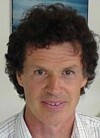 Brian Isbell |
| “The shared philosophy across Westminster’s range of complementary therapy degrees is that students need a compulsory core of health sciences. This includes anatomy, physiology, biochemistry, pathology and differential diagnosis. Phytochemistry and pharmacology are included for degrees in herbal medicine and nutritional therapy.” Brian Isbell |
So on Mondays and Thursdays (for example) the students must believe that response increases with dose, but on Tuesdays and Fridays they are called upon to believe that response decreases with dose.
Isbell admits as much himself when he says “at times students have to work with conflicting scientific models that may not always fit with their clinical practice”. What he does not say is how this absurd conflict is resolved, or how it can be made compatible with science or simple common sense. The course evidently teaches you how to believe several mutually contradictory things at the same time, or at least on alternating days. You don’t need to be a scientist to see that is plain daft.
Not only are some of the doctrines of CAM incompatible with science or common sense, but they are often also incompatible with each other. Homeopaths subscribe to the bizarre doctrine that the less you give the bigger the effect, but herbalists do not. Herbal medicine is nothing other than pharmacology, albeit pharmacology as practised at the beginning of the 20th century, before biological standardisation was introduced to assure constant potency of medicines. So they want to give a sensible dose, but don’t know what it is. Nutritional therapists go to the opposite extreme and want to give huge (and sometimes toxic) doses.
I have been told that herbal medicine students at Westminster are instructed not to talk to the homeopaths in another part of Isbell’s school, because they talk rubbish. They even have separate sections on the university’s intranet, so that one sort of CAM can’t be polluted by the beliefs of a different sort of CAM. Likewise, students of reflexology are taught that a small area on the big toe is connected with the pituitary gland. Not only is this incompatible with physiology, but it is also incompatible with homeopathy, herbal medicine and nutritional therapy.
The department of complementary therapies seems to resemble a collection of religious sects at war with each other, rather than anything recognisable as science.
The second plank in Isbell’s new defence is that students are taught to develop research skills. Homeopathy students get one course (out of 22) called “Methods of Research in Complementary Medicine”, and a project, “Research in Practice”. It is impossible to know what is taught on these courses because the university refuses to release any of the course materials. But I find it hard to imagine that the courses are very critical when the official response from the university cited the Spence (2005) study as though it provided evidence for the efficacy of homeopathy.
If that is the best the teachers can do, what hope is there for the students?
The day after “Science degrees without the Science“ appeared in Nature, the University of Westminster issued a statement . In my view, their statement provides the strongest grounds so far to believe that the BSc is inappropriate.
Let’s take a look at it.
| “The BSc (Hons) Health Sciences: Homeopathy is a fully validated degree that satisfies internal and external quality assurance standards.” |
Well, since the University has so far refused to release any of the documents, it is hard to judge that that validation is worth. The validation documents will, no doubt, appear eventually. Watch this space.One mechanism that is intended to maintain the standard of degrees is the external examiner. Their identities, like almost everything else, are kept secret. In the case of the Westminster BSc in homeopathy, however, we are in luck. According to the Teaching Quality Information (TQI) site, their external examiner is the “Chair of the Society of Homoeopaths”. Since April 2004, that has been Andy Kirk RSHom, a homeopath in private practice, with no degree and no scientific qualifications. He, I imagine, is not likely to question the bizarre homeopathic doctrine that the smaller the dose you give, the bigger effect you get.Correction (4 April 2007). It seems that Westminster supplied wrong information to the TQI site, and the external examiner is not Kirk. They refuse to say who it is. But watch this space.
| “The University’s stance received the backing of the Society of Homeopaths, the UK’s largest register of professional homeopaths”. |
Yes, I’m sure it did. The Society of Homeopaths is an organisation for homeopaths who have no medical qualification. Their scientific credentials can be judged from this quotation from their web site.
“If they are so dilute, how can they work?
After each dilution the mixture is vigorously agitated in a machine that delivers a calibrated amount of shaking. This is called succussion. It is thought that this process imprints the healing energy of the medicinal substance throughout the body of water (the diluent) as if a message is passed on. The message contains the healing energy.”
This is pure gobbledygook. The word “energy” is being used in a way unknown to science. It is mere armwaving in an attempt to ‘explain’ a phenomenon that almost certainly doesn’t occur anyway.
| “In fact there is considerable evidence demonstrating the clinical effectiveness of homeopathic treatment, including a large outcomes study published in 2005, of an analysis of over 23,000 outpatient consultations at the Bristol Homeopathic Hospital, in which more than 7 per cent reported clinical improvement,” |
(Notice the Freudian slip. That should be 70%)
The study to which they allude here has to be the worst paper ever published. It is the infamous Spence (2005) study. Oddly enough, this paper is one that Westminster students were asked to assess critically. Sadly, though, it hasn’t been possible to see any marked answers.
The fact that this is the best evidence that the University can produce in response to criticisms is, perhaps, the best reason ever to think that the material being taught is not, in any sense, science, and is not appropriate for a BSc. It seems that they are hoist by their own petard.
A TV company funded a rather uninformative study of omega-3 fish oil by Prof Basant Puri if Imperial College and the Hammersmith Hospital. The media reports on the study were totally misleading It was not revealed that Prof Puri is named as “inventor” on a paten for the fish oil formulation, as discovered by Ben Goldacre.
Read more on the original IMPROBABLE SCIENCE page
The media reports on the alleged advantages of drinking purple grape juice were uniformly misleading. The study by Alan Crozier did not measure health benefits but was a chemical analysis. Its interpretation in terms of health were arguably over-optimistic.
Read more on the original IMPROBABLE SCIENCE page
Channel 4 TV, Monday 12th March. This is the title of the Channel 4 TV documentary, Dispatches.
Lord Wedderburn, QC, a life peer and Emeritus Professor of Law at the London School of Economics, tells the programme:
“If, in fact, nothing changed and he became King, then there would be a most almighty fuss and controversy, and eventually the whole fabric of the constitutional monarchy could be threatened.”
The Prince’s Foundation for Integrated Health (FIH) is the Prince’s lobby group which attempts to make the hard-pressed NHS spend more money on unproven and disproved treatments. The FIH publishes “Complementary Healthcare: a Guide for Patients”. This document is not just barmy, but positively dangerous. In the rebuttal of the programme on the FIH web site, they claim that they do not promote alternative medicine, but elsewhere on the site they state their aim as “makes safe and effective complementary therapies available to patients in conjunction with conventional healthcare”.
Which would be all very well if they didn’t consistently ignore the evidence for effectiveness.
The MHRA recently, for the first time, betrayed its brief to nake sure that medicines work and are safe. This action has been condemned by just about every professional organisation. Nobody knows exactly what caused them to lose their heads in this way, but it is clear that they were under pressure from both the Department of Health and from the Prince of Wales. The Department of Health is clearly sympathetic to quackery, as shown by the letter below, and by their refusal to allow alternative medicine to be referred to NICE for assessment.
| The MHRA admit to having had at least seven letters form the Prince of Wales, and we know that an MHRA member has met the Prince at Clarence House at least once. But all the contents are secret from the public. The Chairman of the MHRA Agency Board, Prof Alasdair Breckenridge, and chairman of their Herbal Medicines committee, Prof Philip Routledge, have both admitted to me to having had pressure from the Prince of Wales, but neither will give any details, despite having been condemned by their own professional organisation, the British Pharmacological Society. | 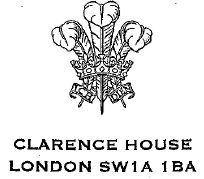 |
The Pharmacological Society’s statement read thus.
| The British Pharmacological Society believes that any claim made for a medicine must be based on evidence, and that it is the duty of the regulatory authorities, in particular the MHRA, to ensure that no claims can be made for the efficacy of any form of medicine unless there is good evidence that the claim is true. Despite many years of investigation, we have no convincing scientific evidence that homeopathic remedies work any better than placebo. Pharmacologists have noted frequently that most homeopathic products are diluted to the extent that they contain no molecule of active ingredient, that is, no medicine, which is highly misleading to consumers who are unlikely to recognise the expression “30C” for example. Furthermore, there are serious concerns, even in cases where they are used for minor ailments, that officially endorsed use of such remedies may put patients at risk of delayed diagnosis. The Society is therefore surprised that the national rules scheme for licensing homeopathic products, which came into force on 1 September (Statutory Instrument 2006 1952), will regard non-scientific data as evidence of efficacy. |
An excellent article on this topic was published by Rose in The Biologist, British health care regulation moves away from science.
The appalling treatment of Professor Edzard Ernst
| Edzard Ernst was the UK’s first professor of complementary medicine, and he is rather unusual in that field because he is totally honest, and very careful about evidence (something that has not always endeared him to the alternative medicine industry).
A letter was sent from Clarence House to the vice-chancellor of Exeter University, Steve Smith. The letter alleged a breach of confidence by Ernst. Having been sent a draft of the Smallwood report, Ernst was so horrified by the scientific standards in that document, he felt obliged, in the public interest, to speak out about it. Ernst was contacted by a newspaper, which had a copy of the draft, and described the initial findings as “outrageous and deeply flawed”. He added: “It is based on such poor science, it’s just hair-raising. The Prince … also seems to have overstepped his constitutional role” |
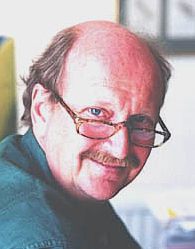
Prof Edzard Ernst. |
Prof Ernst was doing exactly what academics are meant to do. As a result he was subjected to a very prolonged disciplinary procedure, and for a year it was not obvious whether he’d keep his job. For a Prince, in a constitutional monarchy, to put pressure on a university to silence a conspicuously honest academic is just not acceptable.
The Prince of Wales behaviour was bad enough, but, to be generous, he is perhaps, a well-meaning but poorly educated man, filling in his time as best he can.
| In the story of Edzard Ernst, the behaviour of the Vice-Chancellor of Exeter University, Prof Steve Smith seems to me to be unforgivable. Instead of supporting his staff, and supporting academic freedom, he appeared to cower before the Clarence House letterhead. After keeping Prof Ernst on tenterhooks for an entire year he eventually deigned not to fire him in the most grudging and unpleasant way imaginable. |
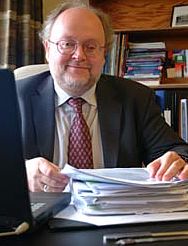 Prof. Steve Smith, Vice chancellor. |
That is illustrated by the end of Smith’s letter to Professor Ernst on 13th October 2006. It was shown on the TV programme, and is reproduced below.
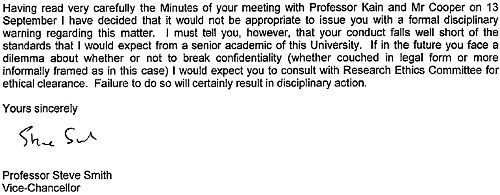
Click to enlarge
The Daily Mail also has features on the healthiness of HRH’s own food lines, after his criticism of MacDonalds, Dutchy Original Sins, and here.
They are worth reading because the advice comes from Catherine Collins, a real dietician, not a nutribollocks guru.
Some responses The story was reported round the world.
Max Hastings (Guardian)
“To make good use of evidence, it is essential to possess not only intelligence, but a capacity for disciplined analysis. The prince has considerable virtues, a good heart notable among them. But he has always lacked discipline in his life and in his treatment of issues. Again and again, he gets himself into trouble by seeking to address matters that are, frankly, beyond his intellectual reach.”
This post has been transferred from the old IMPROBABLE SCIENCE page.
Two interesting papers. One shows popular anti-oxidant ‘supplements’, beta carotene, and vitamins A and D, far from making you live longer, have the opposite effect. Another shows that garlic does not lower cholesterol. And some publicity for Dan Hurley’s book, Natural Causes. An update looks at the activities of the supplements industry spokesperson. Dr Ann Walker, who seems sometimes to forget to declare her interests.
First let’s reiterate the myth of antioxidants
Nutribollocks: the antioxidant myth
“Nutritional supplements” are one of the most profitable scams (see, for example, Healthwatch, Quackwatch, and Holfordwatch).
There is a nice article by Lisa Melton on The Antioxidant Myth: a medical fairy tale in tne New Scientist (and see here), [download as pdf] . Here are some quotations.
| Cranberry capsules. Green tea extract. Effervescent vitamin C. Pomegranate concentrate. Beta carotene pills. Selenium. Grape seed extract. High-dose vitamin E. Pine bark extract. Bee spit.You name it, if it’s an antioxidant, we’ll swallow it. According to some estimates around half of US adults take antioxidant pills daily in the belief that they promote good health and stave off disease. . . . In 1992 researchers at the US National Cancer Institute set about testing beta carotene. The trial was set to run for 6 years, but two-thirds of the way through the researchers pulled the plug after discovering, to their surprise and horror, that those taking supplements were doing worse than the controls. They had developed 28 per cent more cases of lung cancer, and their overall death rate was 17 per cent higher. It’s a similar story with the world’s most popular antioxidant. Vitamin E shot to fame in the early 1990s, after two large studies involving more than 127,000 people in total found that those with a diet high in vitamin E were significantly less likely to suffer cardiovascular disease. Use of vitamin E supplements soared. In 1990, almost nobody took vitamin E; by the end of the decade an estimated 23 million US citizens were knocking back daily doses. |
“Treatment with beta carotene, vitamin A, and vitamin E may increase mortality”
That is the conclusion of a recent paper in the Journal of the American Medical Association, “Mortality in Randomized Trials of Antioxidant Supplements for Primary and Secondary Prevention” Systematic Review and Meta-analysis”, [Get the full text].
This isn’t original research, but a meta analysis that attempts to collate existing data taking into account the reliability of each source. The aim was to analyze the effects of antioxidant supplements (beta carotene, vitamins A and E, vitamin C [ascorbic acid], and selenium) on deaths (from any cause) in adults. The analysis seems to have been done well, and the results are startling. They aren’t just a waste of money, but some of them are actually bad for you. In 47 low-bias trials with 180 938 participants, beta carotene increased death rates by 7 per cent, vitamin A by 16 per cent, and vitamin E by 4 per cent (when taken separately). Vitamin C gave contradictory results and selenium showed no detectable effect.
This work got an excellent write-up in The Times, by their health correspondent, Nigel Hawkes. This was followed by a predictably silly defence of nutribollocks by the Times’ Dr Thomas Stuttaford (known in Private Eye as Dr Utterfraud). Luckily, this was neutralised by a second piece on the same page by Nigel Hawkes, “Phooey. Sensible balanced diet is the best investment”:
“ In nutrition, a plausible idea and a little bit of evidence are all that is needed to create a market. And such is the megaphone of marketing and the influence of countless “healthy eating” articles that these ideas, even the half-baked ones, can lodge very firmly in the national psyche.”
It’s a nice coincidence that this study came out while I was reading Dan Hurley’s book, Natural Causes (see below). This book sets out dramatically the harm, sometimes serious harm, that untested “supplements” have done to some individuals. But for me the most interesting part is the revelation of the political lobbying by this $20 billion supplement industry, with the aim (largely successful) of undermining the FDA and escaping from any effective regulation of its absurd, but exceedingly profitable, claims. The supplements industry puts the Prince of Wales in the shade when it comes to subverting common sense and good science.
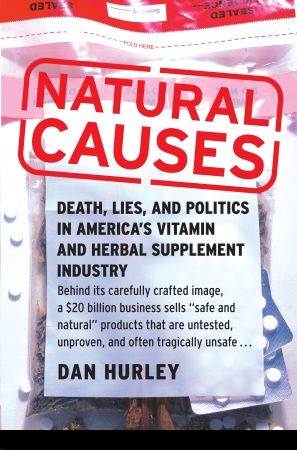
The Health Supplements Information Service (HSIS)
Needless to say, the supplements industry has already organised vilification of this excellent bit of work.
According to their web site,
“HSIS is funded by The Boots Company PLC, Bayer PLC, Perrigo, Seven Seas Ltd and Wyeth Consumer Healthcare. The campaign is co-ordinated by PAGB (Proprietary Association of Great Britain)”.
So it’s no surprise that their spokesperson. Dr Ann Walker, immediately tried to discredit the study, saying “The results of these mixed-sample metaanalyses are worthless” (The Times).
This same Ann Walker recently wrote and editorial in the British Journal of General Practice (January 2007). The editorial concludes “Although still considered to be controversial by some, taking a daily multinutrient supplement would bridge the gap between intake and requirements and ensure that nutrient target intakes are met.” But in this editorial her affiliation is given as Senior Lecturer in Human Nutrition, University of Reading. No mention at all of her role as spokesperson for the Supplements industry. Tut tut.
Patrick Holford too
Needless to say, supplement salesman Patrick Holford has weighed into the vilification. His objections have been dealt with nicely on the cutely named web site stopholfordtalkingrubbish.blogspot.com. Find the answers here.
Holford is the man who, in the BMJ said “Competing interests: none declared”, when promoting his supplements.
No interests? Holford himself has said
“any product, be it a publication, seminar, food or supplement, that is authored/invented by me has my name on it and earns me a royalty/payment. That is how I live and fund my research.”
So what about the galaxy of supplements being sold at “Health products for Life”? They say “we only supply supplements, foods and drinks that are recommended by nutrition expert, Patrick Holford.” And at the bottom of the page it says “©Copyright 2007 Holford and Associates. All Rights Reserved”. Companies House lists the sole shareholder in ‘Health Products for Life’ as P.J. Holford.
Garlic is no good either
Another interesting recent paper has appeared in Archives of Internal Medicine
Garlic is widely promoted as a cholesterol-lowering agent, but the evidence so far has been lousy. In this trial, 192 adults with low-density lipoprotein cholesterol (LDL-C) concentrations of 130 to 190 mg/dL (3.36-4.91 mmol/L) were randomly assigned to one of the following four treatment arms: raw garlic, powdered garlic supplement, aged garlic extract supplement, or placebo.
“Conclusions None of the forms of garlic used in this study, including raw garlic, when given at an approximate dose of a 4-g clove per day, 6 d/wk for 6 months, had statistically or clinically significant effects on LDL-C or other plasma lipid concentrations in adults with moderate hypercholesterolemia.”
Another purveyor of nutribollocks who has been dissected and exposed by Ben Goldacre. His views on AIDS are a menace to humanity. And, incredibly his course has been accredited by the University of Bedfordshire (formerly known as the University of Luton).
Read full entry on the original IMPROBABLE SCIENCE page.
Using potassium dichromate to treat patients in intensive care (rather than to clean the glassware)?
No, that isn’t a joke. The respectable journal, Chest, official journal of the American College of Chest Physicians, published an article that purported to show that homeopathic potassium dichromate (i.e. water) was a useful way to treat patients in intensive care. [Frass M, Dielacher C, Linkesch M, et al. Influence of potassium dichromate on tracheal secretions in critically ill patients. Chest 2005; 27:936–941].
The title and abstract don’t mention the word ‘homeopathy’ at all. Potassium dichromate, like all hexavalent chromium compounds, is very toxic, but luckily for the patients there was no potassium dichromate present whatsoever in the treatment (it was a 30C dilution). The editor of Chest didn’t seem to think that there was anything very odd about this, but he did publish a response from me: Treating Critically Ill Patients With Sugar Pills, Chest, 131 , 645, 2007 [Get pdf ].
“It is one thing to tolerate homeopathy as a harmless 19th century eccentricity for its placebo effect in minor self-limiting conditions like colds. It is quite another to have it recommended for seriously ill patients. That is downright dangerous.”
This was accompanied by an unrepentant response from Frass.
The Frass paper has now received some close attention on the Respectful Insolence blog. Someone posting under the name ‘getzal’ has done a nice analysis which shows that the control group must have contained patients who were were more seriously ill than the homeopathically-treated group.
This week’s abusive email
For a bit of light amusement, I decided to publish the occasional bit ot email correspondence. This one arrived on 9th Feb 2007.
| From: “Stephanie Ginn”To: d.colquhoun@ucl.ac.uk Subject: homoeopathic medicine If Homoeopathic medicine doesn’t work, and it is all in the mind, how is it that if I give the wrong remedy my patients don’t get better, but when I find the right one they frequently do?This is as true of sore throats and ear infections in small children as it is to asthma and Rheumatoid Arthritis in adults. You really should do more research before shouting your mouth off over things you clearly know nothing about. We can’t all be that stupid… Stephanie |
| Dear Ms Ginn Thanks for writing. I’m always interested to hear from people like you. (though my reply will be a bit more courteous than your letter). You say “how is it that if I give the wrong remedy my patients don’t get better, but when I find the right one they frequently do? I think that you have hit the nail on the head, If you can produce the numbers to show that what you say is true, then I and everyone else I know will believe you (it would, of course, have to be done by comparison with an appropriate control group). The problem is that the homeopathic community have had 200 years to produce the evidence, and so far it has not been forthcoming.I suppose it is true to say that the evidence would have to be good in view of the inherent implausibility of homeopathy. If it turned out that it was possible to produce an effect with no molecules present, the whole of present day chemistry and physics would be overturned and since it seems to work rather well that would be surprising. Nevertheless, it is what would happen if you produced the evidence (and you’d probably get a Nobel prize too).I think though, it is your responsibility to do the research, not mine Best regards David Colquhoun |
| Thank you for your reply. Homoeopathy may sound implausible, I agree, it does if you only look at modern so called science. There are plenty of things in life which are unexplained, such as love…you can’t see it but would you deny it’s existance? I am sure and hope that you must have felt it? You are right so far in that to convince people they need proof. However, for most of us as Homoeopaths, our proof is that our patients get well, and they do, most of the time. That is generally enough proof for our patients too, especially when their brain tumours disappear. Of course there will always be some placebo effect in some people as in medicine of any sort. Perhaps you should try it for yourself and FEEL the proof…you will probably find that to be enough for you too.. Oh and by the way I think that present day physics and chemistry beliefs need overturning, desperately. Stephanie |
| Thanks for those comments. I see that you really do appreciate the need to produce evidence if you are to convince people, however convinced you may be yourself. Your most intriguing comment, though, was ” I think that present day physics and chemistry beliefs need overturning, desperately”. But it seems to me that your scepticism about the success of chemistry and physics doesn’t extend to computers, email, the web, mobile phones, motor cars and aircraft. They are all products of the application of chemistry and physics and 100 years ago they would have seemed miraculous). That leaves me wondering which bits of chemistry and physics you don’t like! Best regards David Colquhoun |
At this point, all I got back was
| Ok maybe redefining and definately [sic] rethinking are closer to the mark.Stephanie |
